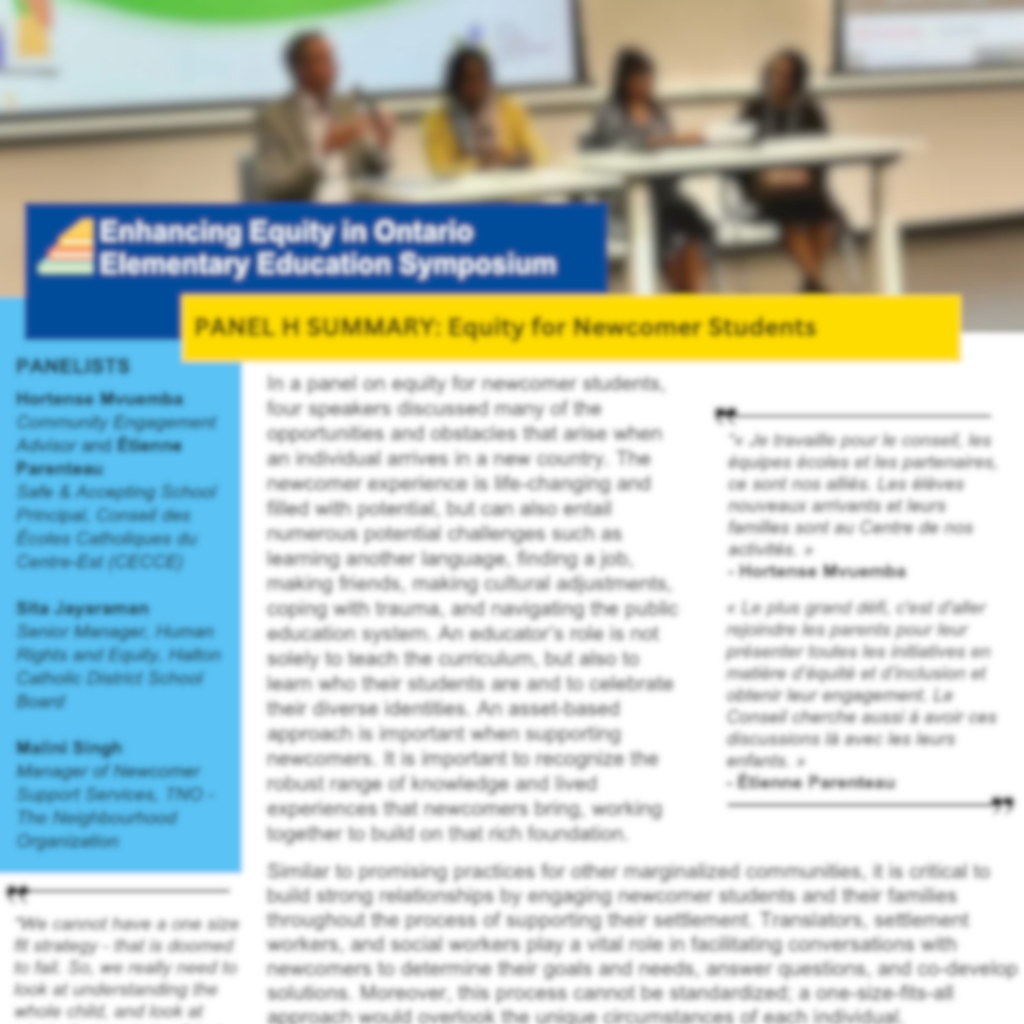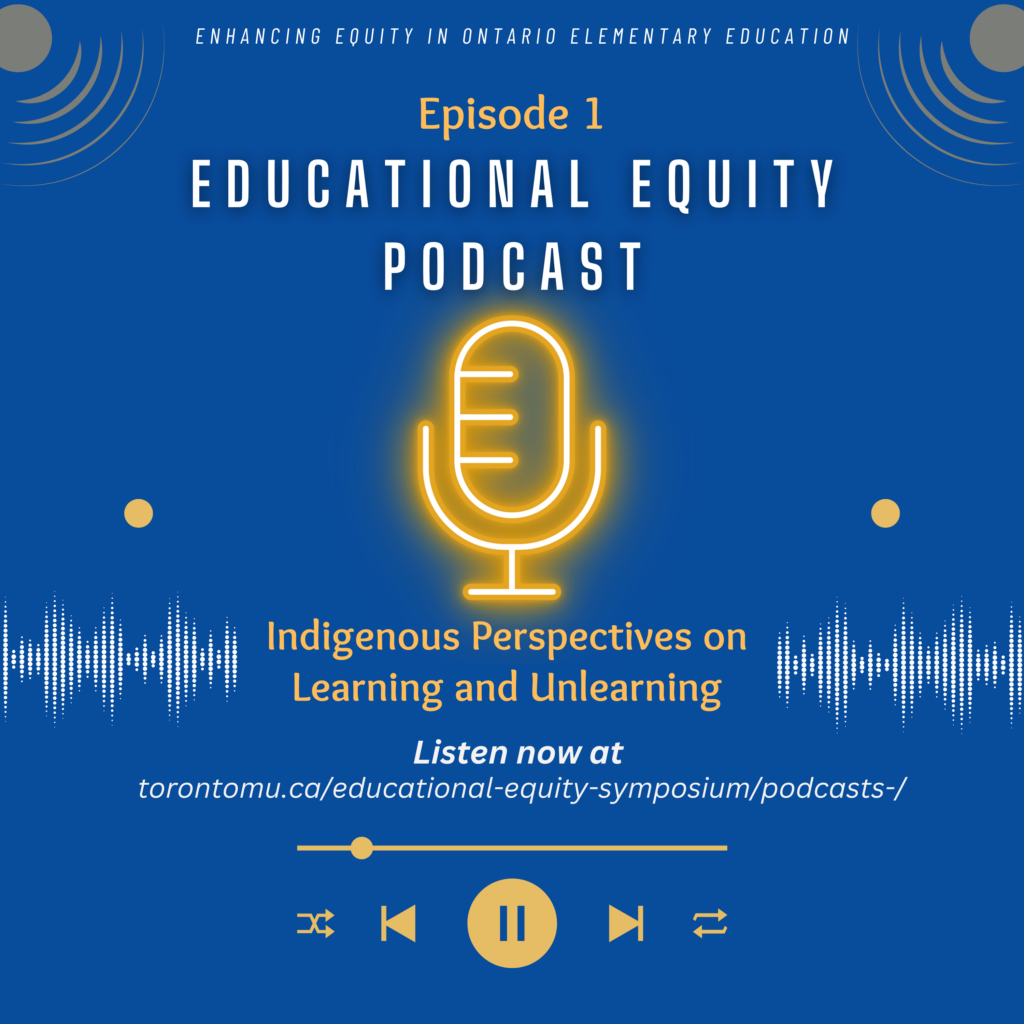
The Enhancing Equity in Ontario Elementary Education Symposium took place on October 11 and 12, 2023. The symposium invited participation by all Ontario district school boards, education stakeholders, and scholars focused on educational equity and human rights to allow for sharing of promising practices around equity-based initiatives, along with providing space to reflect on and commit to action towards enhanced equity for elementary school students. At the symposium, in partnership with podcast host Stephen Hurley (voiceEd Radio), we hosted a powerful series of ‘Speaker’s Corner’ podcast conversations with equity leaders across the province.
Each Educational Equity Podcast episode explores the ongoing work of dismantling systemic barriers in education and highlights the lived experiences, insights, and calls to action from advocates and educators working to make education more inclusive and equitable.
Educational Equity Podcast #2: Speaker’s Corner – Relationships, Dialogue, and Listening with Atala Andratis
In this episode, Atala Andratis, Equity Lead for the Grand Erie District School Board, shares about the essential role of dialogue in breaking down barriers and building inclusive environments. Drawing from her multilingual background and experiences as an educator, Atala advocates for an asset-based approach to supporting diverse student populations.
Some key messages from this episode include:
- Equity in education involves removing systemic barriers that prevent students from accessing what they require to be successful.
- Building relationships with students is essential in creating transformative and responsive learning environments.
- Educators hold immense power and responsibility in making decisions that significantly impact student’s lives, and they must approach this sacred trust with care and awareness.
Educational Equity Podcast #3: Speaker’s Corner – Community Voices and Appreciating the Whole Fruit Salad with Ingrid Palmer
In this episode, Ingrid Palmer, founder of Focus on Ability and Principal IDEAL Advocate at Realize, shares about the importance of educational equity for students with disabilities, drawing from her personal journey, extensive experiences, and as a passionate advocate for inclusive practices.
Some key messages from this episode include:
- Language in disability advocacy: The conversation highlights differing perspectives on language around disability.
- Promoting inclusive education: Ingrid discusses strategies for supporting students with disabilities in schools, and advocates for a collective lens and supporting equity to reduce stigma and enhance inclusion.
- Authentic community engagement: Emphasizing the need for community voices in decision-making, Ingrid calls for a shift in how institutions engage with communities, and advocates for community-led initiatives in addressing systemic barriers.
Educational Equity Podcast #4: Speaker’s Corner – Culturally Relevant Pedagogy with Karen Murray
In this episode, Karen Murray, System Superintendent for Equity, Anti-Oppression, and Early Years at the Toronto District School Board, discusses her book My Best Idea: Culturally Relevant Pedagogy and the everyday practices that support equity in classrooms. Karen emphasizes the value of educators embedding culturally relevant approaches in all aspects of teaching.
Some key messages from this episode include:
- Equity work needs to be braided into everyday teaching practices, not treated as a separate initiative.
- Educators should honour community and family knowledge by inviting families to share the different ways they engage with subjects at home, and also share their approaches in the classroom with families.
- Culturally Relevant Pedagogy is about setting high expectations, demonstrating cultural competence, and developing students’ critical consciousness.
Educational Equity Podcast #5: Speaker’s Corner – Human Rights and Equity Initiatives with Pam Agawa
In this episode, Pam Agawa, Human Rights and Equity Lead for Keewatin Patricia District School Board, discusses the shift from research to actionable steps, the importance of community relationships and innovative approaches to overcoming systemic barriers. With a background in both education and government, Pam shares about the challenges and possibilities of ongoing efforts to create inclusive and supportive learning environments.
Some key messages from this episode include:
- Action Over Research: Pam emphasizes the need to move from continuous data collection to implementing concrete actions that address educational equity challenges.
- Community and Relationships: Establishing strong, reciprocal relationships within communities is crucial for the success of equity initiatives.
- Innovation and Precedent: Pam advocates for innovation in overcoming systemic barriers. She stresses the importance of collaboration among educational leaders across different districts to set new precedents and push the boundaries of established protocols.
To cite these podcasts:
Hurley, S. (Host) and Andratis, A. (Guest). (2024, August 27). Relationships, dialogue, and listening with Atala Andratis (No. 2) [Audio Podcast Episode]. In Educational Equity Podcast. https://www.spreaker.com/episode/educational-equity-relationships-dialogue-and-listening-with-atala-andratis–57934008
Hurley, S. (Host) and Palmer, I. (Guest). (2024, August 30). Community voices and appreciating the whole fruit salad with Ingrid Palmer (No. 3) [Audio Podcast Episode]. In Educational Equity Podcast. https://www.spreaker.com/episode/educational-equity-community-voices-appreciating-the-whole-fruit-salad-with-ingrid-palmer–57934005
Hurley, S. (Host) and Murray, K. (Guest). (2024, September 4). Culturally relevant pedagogy with Karen Murray (No. 4) [Audio Podcast Episode]. In Educational Equity Podcast. https://www.spreaker.com/episode/educational-equity-culturally-relevant-pedagogy-with-karen-murray–57934001
Hurley, S. (Host) and Agawa, P. (Guest). (2024, September 4). Human rights and equity initiatives with Pam Agawa (No. 5) [Audio Podcast Episode]. In Educational Equity Podcast. https://www.spreaker.com/episode/educational-equity-human-rights-and-equity-initiatives-with-pam-agawa–57934004
To listen to the podcasts, review the transcripts and for more information, head to https://www.torontomu.ca/educational-equity-symposium/podcasts-/





